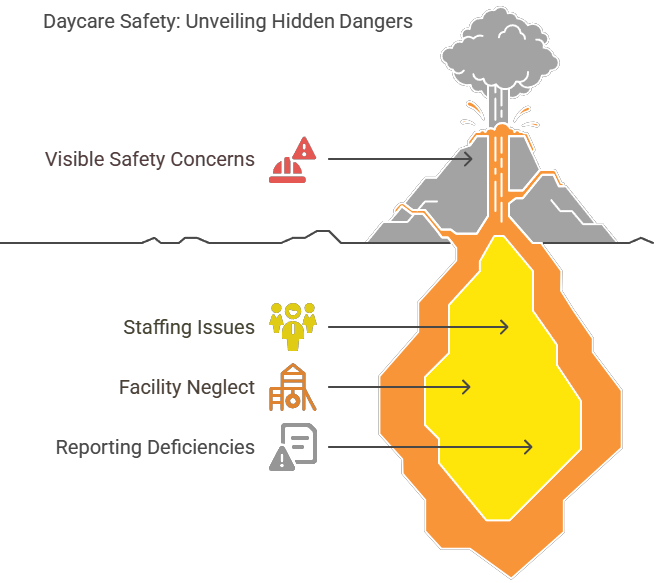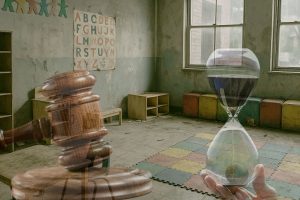Don’t Let Common Misconceptions Keep You From Protecting Your Child’s Rights.
When a child gets injured at daycare, parents are often left with more questions than answers. Should I speak up? Was it just an accident? Do I even have a case? The truth is, many families never explore their legal options because of widespread myths that make them second-guess themselves. These misconceptions can delay justice and leave dangerous situations unaddressed.

This article breaks down five of the most common myths about daycare injury lawsuits in Texas. It also explains what makes a daycare legally liable, what red flags to watch for, and how parents can take informed steps after an injury. If you’ve ever hesitated to act because you weren’t sure what was true, keep reading. You deserve clarity, and your child deserves protection.
Myth 1 – “If It Was an Accident, There’s No Case”
Accidents do happen, but that doesn’t always mean no one is responsible.
Negligence doesn’t require intent. If the daycare failed to act with reasonable care, they could still be legally liable. Examples include leaving sharp objects within reach, failing to supervise playtime, or ignoring safety rules. These situations are preventable. If a reasonable step could have avoided the injury, you may have a strong case.
Myth 2 – “You Can’t Sue If You Signed a Waiver”
Waivers often sound final, but they rarely are when it comes to child safety.
While some daycares ask parents to sign liability waivers, these don’t usually protect against negligence. Texas law places a strong duty of care on child care providers. If your child is injured because this duty was not met, the waiver is unlikely to block a legal claim. Always consult an attorney before assuming you’ve waived your rights.
Texas courts have consistently ruled that waivers don’t shield daycares from claims involving negligence, especially when safety standards are violated (see Pine v. Derieux, 2016, and Goode v. Woodlands Operating Co., 2000).
Myth 3 – “Minor Injuries Aren’t Worth Pursuing”
Small injuries can carry big consequences.
What seems minor, like a bump or a bruise, can lead to lasting issues. Medical costs, emotional distress, and disrupted routines can add up. More importantly, filing a claim can encourage better safety practices and protect other children from future harm.
In some Texas cases, parents have recovered not only medical costs but also long-term therapy and emotional damages, especially when a child’s trauma continues after the event (Zapata v. Children’s Discovery Ctr., 2004).
Myth 4 – “The Daycare Will Retaliate Against My Child”
No parent wants to risk their child’s well-being, but staying silent won’t make things safer.
State and federal laws forbid retaliation against families who raise safety concerns. Reputable providers take feedback seriously and work to resolve issues. If a daycare reacts negatively, that could be another legal issue worth addressing. Protecting your child should never come with a penalty.
In one 2023 Texas case, a daycare was sued for leaving a child alone in a van. This was clear evidence of supervision failure. Holding centers accountable often improves safety for all children (source: KFDX-TV, Wichita Falls, March 2023).
Myth 5 – “Lawsuits Take Forever and Are Too Expensive”
Legal action often sounds more burdensome than it really is.
Most personal injury lawyers work on contingency, which means you don’t pay unless they recover money for you. Many cases settle without going to court, often in a matter of months. An experienced attorney handles the process so you can focus on your child.
What Makes a Daycare Legally Liable in Texas?
Not every injury leads to a valid lawsuit. To hold a daycare legally liable, there must be evidence that the facility breached its legal duty of care and that this failure directly caused the child’s injury.
Key Elements of Liability:
- Duty of Care: Texas daycares are legally required to maintain safe premises, hire qualified staff, supervise children properly, and comply with regulations from the Texas Department of Family and Protective Services.
- Breach of Duty: A daycare may breach this duty by ignoring hazards, understaffing rooms, failing to monitor activities, or neglecting to report injuries.
- Causation: The injury must be directly linked to the daycare’s failure to meet its responsibilities. For example, a child who is injured after being left unsupervised near climbing equipment may have a strong case.
- Damages: This includes physical injury, medical bills, emotional harm, or long-term consequences.
Even if the injury seems accidental, liability can exist when proper precautions could have prevented it. Parents don’t have to prove intentional harm, just that the center failed to act as a reasonable provider would under similar circumstances.
Signs of Negligence Parents Should Watch For
- High child-to-staff ratio
- Broken or unsafe playground equipment
- Unlocked doors or access to hazardous items
- Staff who seem inattentive, untrained, or overwhelmed
- Lack of incident reports or vague explanations for injuries

Common Defenses Daycares Use (and Why They May Not Work)
Blaming the Child
One common defense is blaming the child, suggesting the injury happened because the child was being reckless or clumsy. Texas law doesn’t excuse daycares from liability if supervision was inadequate. Children are expected to be impulsive and active – it’s the caregiver’s job to anticipate and prevent foreseeable risks.
Calling It Unforeseeable
Another defense is that the accident couldn’t have been predicted. But courts regularly find that many injuries, such as allergic reactions to known allergens or falls from playground equipment, are foreseeable. When a center fails to take reasonable precautions, that argument loses strength.
Denying the Incident Occurred
Some daycares claim an injury wasn’t reported or didn’t happen under their watch. This tactic can fall apart quickly if parents provide photos, medical records, or testimony from others. Consistent documentation by parents can effectively counter this denial.
FAQs on Daycare Injury Myths
Can I report the daycare to a state agency too?
Yes. In Texas, the Department of Family and Protective Services (DFPS) accepts complaints, which may prompt an inspection or investigation.
What should I document after an injury?
Take photos of injuries, collect medical records, and write down any statements from your child or staff. This information is key if you decide to take legal action.
How long do I have to file a claim in Texas?
In most cases, you have two years from the date of injury to file a claim. Don’t wait. Talking to a lawyer early can make the process smoother.
What if the daycare didn’t call me when my child got hurt?
Failing to notify parents about an injury may indicate negligence or an attempt to hide what happened. Texas law requires prompt communication. If this step was skipped, it could strengthen your claim.
Can I take legal action if another child hurt mine?
Possibly. If the daycare failed to supervise adequately or ignored a known issue with the other child, the facility might still be held responsible for the injury.
What if my child is too young to explain what happened?
Watch for changes in behavior, seek medical evaluation, and record anything that raises concern. A lawyer can assist with gathering other forms of evidence, including witness accounts or video footage.
Does the daycare have to show me surveillance footage?
If footage exists, it can often be requested during the legal process. A lawyer can help formally request this evidence. If the daycare refuses or delays, that may be a red flag.
Can I sue even if my child has recovered?
Yes. Even if your child has physically recovered, you may still have a valid claim for emotional trauma, pain experienced, or medical expenses already incurred.
Real Legal Facts from Texas Cases
- Texas courts reject daycare waivers in many negligence cases (Pine v. Derieux, 2016)
- Licensed centers owe children a high standard of care (Texas DFPS Child-Care Licensing Division)
- Courts have awarded damages for therapy, trauma, and future costs (Zapata v. Children’s Discovery Ctr., 2004)
- Leaving a child in a vehicle has led to successful lawsuits (Wichita Falls case, KFDX-TV, 2023)
- A Dallas jury awarded $142 million in a gross negligence daycare case (Estate of Emmanuel Snow v. All Stars Childcare, 2016)
Talk to a Texas Child Injury Lawyer Today
If your child was injured at daycare, it’s important to know your options. Speaking with a lawyer doesn’t mean you’re starting a lawsuit, it just means you’re getting answers. Reach out today at 214-957-0898 for a free consultation and find out what steps to take next.
Page Contents
- Don’t Let Common Misconceptions Keep You From Protecting Your Child’s Rights.
- Myth 1 – “If It Was an Accident, There’s No Case”
- Myth 2 – “You Can’t Sue If You Signed a Waiver”
- Myth 3 – “Minor Injuries Aren’t Worth Pursuing”
- Myth 4 – “The Daycare Will Retaliate Against My Child”
- Myth 5 – “Lawsuits Take Forever and Are Too Expensive”
- What Makes a Daycare Legally Liable in Texas?
- Signs of Negligence Parents Should Watch For
- Common Defenses Daycares Use (and Why They May Not Work)
- FAQs on Daycare Injury Myths
- Can I report the daycare to a state agency too?
- What should I document after an injury?
- How long do I have to file a claim in Texas?
- What if the daycare didn’t call me when my child got hurt?
- Can I take legal action if another child hurt mine?
- What if my child is too young to explain what happened?
- Does the daycare have to show me surveillance footage?
- Can I sue even if my child has recovered?
- Real Legal Facts from Texas Cases
- Talk to a Texas Child Injury Lawyer Today



